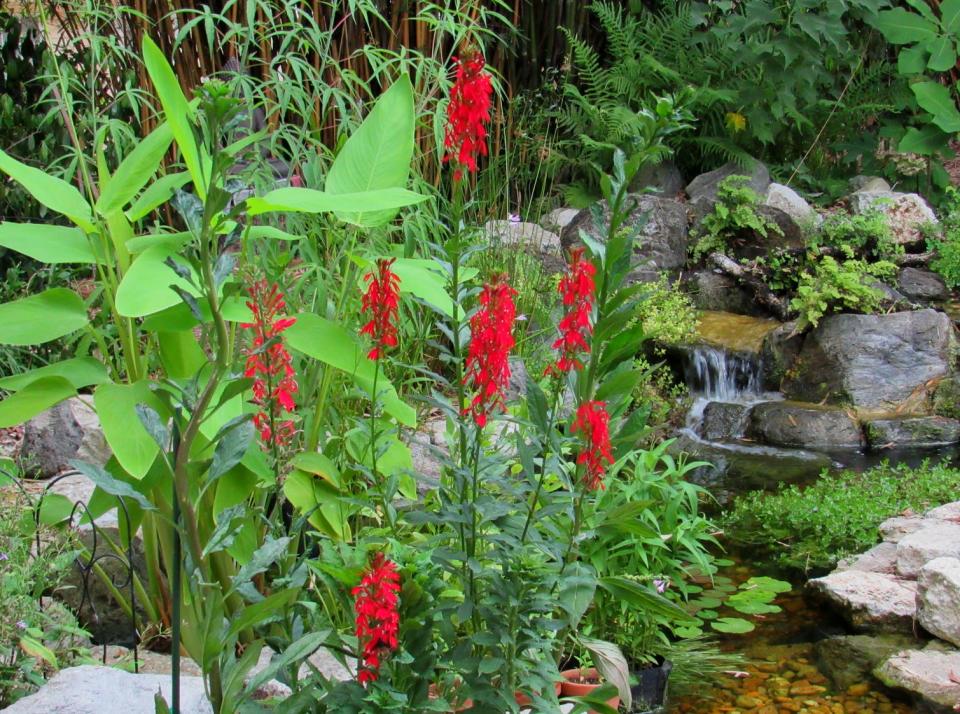Have you ever considered that a team of local Master Gardener Volunteers might be available to visit your home and offer advice? This free service is part of the UF/IFAS Extension Leon County’s Florida Yards & Neighborhoods (FYN) program.
The FYN program is designed to help homeowners make their landscaping and lawn care more environmentally friendly, which in turn helps protect Florida’s environment and conserve water.
FYN encourages homeowners to create a Florida-Friendly Landscape (FFL) by following nine principles: right plant, right place; water efficiently; fertilize appropriately; mulch; attract wildlife; manage yard pests responsibly; recycle; reduce stormwater runoff; and protect the waterfront.
Locally, teams of Master Gardener Volunteers (MGVs) from the UF/IFAS Extension Leon County Office (located at 615 E. Paul Russell Road) help homeowners make their yards more Florida-Friendly. They do this by providing consultations focused on the homeowner’s specific concerns related to the nine FFL principles or by evaluating landscapes whose owners believe they meet the criteria for Florida-Friendly Yard recognition.

UF/IFAS Field and Fork staff and students install a Florida-Friendly Landscaping Natural demonstration garden at the field office in May 2024.
Want a yard consultation?
A yard consultation offers a valuable service to homeowners by informally assessing how well a landscape aligns with the nine FFL principles. Team members may suggest plant choices based on site conditions, such as soil and sunlight, or recommend alternatives for problem areas – but they do not provide landscape design services.
To request a consultation, homeowners can complete the application form available at sfyl.ifas.ufl.edu.
After submitting the form via email, the homeowner will be assigned to one of five MGV teams. The team chair will then contact the homeowner to gather additional information and schedule a site visit.
During the visit, the team meets with the homeowner, tours the yard, takes notes, and – with permission – photographs key areas. Afterward, they prepare a comprehensive report with suggestions aligned with the FFL principles. In our experience, homeowners find these visits and reports incredibly helpful for identifying next steps to improve their yards.

This Tallahassee yard proudly displays a flag reflecting Florida-Friendly Landscaping recognition at the Gold level.
Are you ready for recognition?
Leon County also offers special recognition for homeowners who implement sustainable landscaping practices, based on an evaluation using Florida-Friendly Landscaping checklists.
Florida-Friendly Landscapes reduce the use of potable irrigation water, minimize runoff from fertilizers and pesticides, and provide habitat for wildlife. Yards of any style – traditional or natural – can qualify. Ultimately, it’s the landscape’s design and maintenance that determines whether it qualifies as Florida-Friendly.

Pollinator insects, such as this Gulf fritillary, are critical to the development of our food supply.
The FFL Home Landscape Silver and Gold recognitions apply to yards that use fertilizer, irrigation, and other “traditional” gardening practices.
A new level of recognition – FFL Natural – was introduced in 2024 as an alternative to the Silver and Gold tiers. This level focuses on low-maintenance methods and plant selections that thrive with minimal intervention. Its goal is to recognize homeowners who go above and beyond to protect water resources and provide pollinator- and wildlife-friendly habitats.
The application process for yard recognition begins with completing the FFL Home Recognition Checklist, which outlines best practices under each of the nine FFL principles. There are two versions: the Home Landscape Checklist and the Natural Checklist. Both are available at ffl.ifas.ufl.edu.
Homeowners use the checklist to evaluate their landscape and make any needed adjustments. The publication resources at ffl.ifas.ufl.edu offer guidance for making any yard more Florida-Friendly.

Plants native to North Florida enhance this backyard pond. Lush green leaves of alligator flag at left; cardinal flower blooming at center.
When the homeowner feels that the landscape is ready, the application form for a home visit specified above should be completed and returned to the Extension Office. In addition, the homeowner will need to provide a plant list for their landscape, as recognition requires a specific percentage of Florida native plants. The assigned MGV team then schedules a site visit, meets with the homeowner, and verifies the self-assessment checklist responses provided by the homeowner.
After the visit, the applicant receives an emailed report. If the team recommends the yard for Silver, Gold, or FFL Natural recognition, the local residential horticulture agent reviews the documentation and notifies the homeowner of the final results. Homeowners who receive recognition will be awarded a yard flag to display their Silver, Gold, or FFL Natural status.
Each Florida-Friendly Landscape Recognition is valid for two years from the original recognition date. Re-evaluation is required at that point to determine continued eligibility, based on the latest version of the checklist. The re-evaluation process follows the same steps outlined above.
Show your commitment to protecting Florida’s water and natural resources by making your landscape Florida-Friendly – with help from your local Master Gardener Volunteers. I hope many of you will earn recognition for your efforts toward responsible gardening.
Susan Barnes is a Master Gardener Volunteer with UF/IFAS Leon County Extension, an Equal Opportunity Institution. For gardening questions, email AskAMasterGardener@ifas.ufl.edu.
This article originally appeared on Tallahassee Democrat: Master Gardener Volunteers deliver advice for a Florida-Friendly yard
